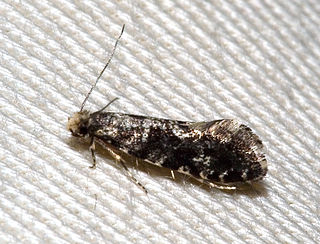
Tineidae is a family of moths in the order Lepidoptera described by Pierre André Latreille in 1810. Collectively, they are known as fungus moths or tineid moths. The family contains considerably more than 3,000 species in more than 300 genera. Most of the tineid moths are small or medium-sized, with wings held roofwise over the body when at rest. They are particularly common in the Palaearctic, but many occur elsewhere, and some are found very widely as introduced species.
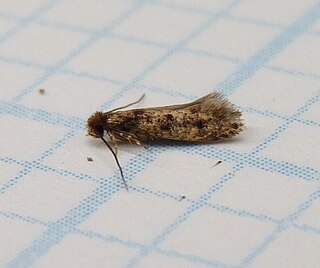
Phereoeca is a genus of moths belonging to the family Tineidae. The larvae of these moths build protective silk cases and some are moderate household pests.

Phereoeca uterella, known by the vernacular names plaster bagworm and household casebearer, is a moth species in family Tineidae. It occurs in tropical climates, where it is common in houses, and is presumed native to the Neotropical realm. In the Americas, it has been recorded from Brazil, Guyana, and the southern United States as well as the Virgin Islands and Trinidad, and tentatively identified from Tobago.

Trametes is a genus of fungi that is distinguished by a pileate basidiocarp, di- to trimitic hyphal systems, smooth non-dextrinoid spores, and a hymenium usually without true hymenial cystidia. The genus has a widespread distribution and contains about 195 species. The genus was circumscribed by Elias Magnus Fries in 1836.

Tinea pellionella, the case-bearing clothes moth, is a species of tineoid moth in the family Tineidae, the fungus moths. This species has a cosmopolitan distribution, occurring nearly worldwide.
Phthinocola is a genus of moths belonging to the family Tineidae.
Cimitra is a genus of moths belonging to the family of Tineidae. Most species of this genus are found in Africa but Cimitra sechusella Walker, 1864 is found in Southeast Asia.
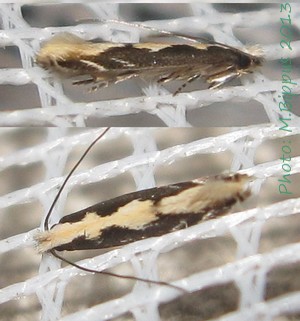
Amphixystis is a genus of moths belonging to the family Tineidae. The family was first described by Edward Meyrick in 1901.

Tenaga is a genus of moths belonging to the family Tineidae.
Stemagoris is a genus of moths belonging to the family Tineidae.
Tineomigma is a genus of moths belonging to the family Tineidae.

Tinea trinotella is a species of tineoid moth. It belongs to the fungus moth family (Tineidae), and therein to the nominate subfamily Tineinae. It was once used as type species of a distinct genus Acedes, but this is synonymized today with Tinea, the type genus of Tineinae, Tineidae and the superfamily Tineoidea.
Scardia is a genus of the fungus moth family (Tineidae). Therein, it belongs to the subfamily Scardiinae, of which it is the type genus. Several of the species placed here in earlier times have been moved to other genera of the subfamily, e.g. Amorophaga, Montescardia, and Morophaga.

Tinea is a genus of the fungus moth family, Tineidae. Therein, it belongs to the subfamily Tineinae. As evident by its name, it is the type genus of its subfamily and family. Established as one of the first subgroups of "Phalaena", it used to contain many species of Tineidae that are nowadays placed in other genera, as well as a few moths nowadays placed elsewhere.
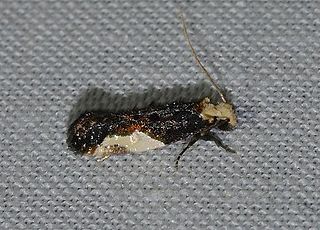
Monopis longella is a moth of the family Tineidae. It has been recorded from China, Korea India, Japan, Malaysia, Philippines, Russia and Thailand and is an introduced species in North America, where it has been recorded from New York to central Florida and west to Michigan.
Praeacedes is a monotypic moth genus in the family Tineidae first described by Hans Georg Amsel in 1954. Its only species, Praeacedes atomosella, was first described by Francis Walker in 1863. It has a wide range and has been recorded from Europe, Australia, Hawaii, India, Malaysia, Solomon Islands, Easter Island, Mauritius, Madagascar, Réunion, South America and North America. The species has commonly been misidentified in various parts of the world.
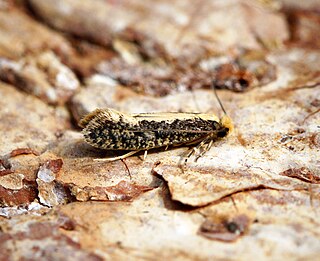
Monopis crocicapitella, the pale-backed clothes moth, or the bird-nest moth, is a moth of the family Tineidae described by James Brackenridge Clemens in 1859. It has a nearly cosmopolitan distribution. It was first described from the eastern United States.

Karsholtia is a genus of moths of the family Tineidae. The genus contains the single species Karsholtia marianii. It is found in Norway, Sweden, Denmark, Germany, Austria, France and on Sicily.

Philonome albivittata is a species of moth from the Tineidae family found in French Guiana.

The Tineinae are a subfamily of moths of the family Tineidae.












